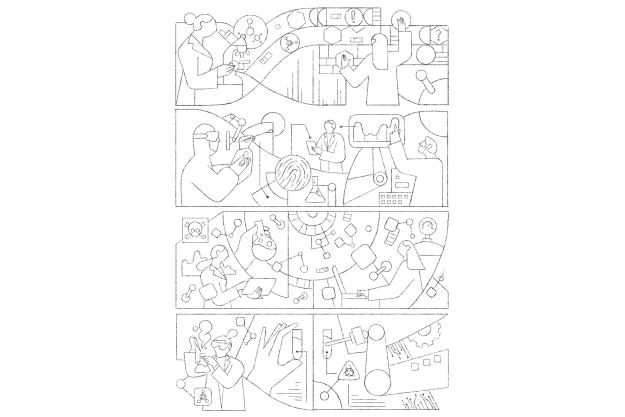The OPCW has partnered with four research institutions selected for the OPCW Artificial Intelligence Research Challenge , an initiative launched in July 2024, funded by the European Union and the United Kingdom of Great Britain and Northern Ireland (UK).
The challenge aims to explore AI applications to enhance OPCW's ability to detect and respond to current and future chemical threats. The four teams - Canada's University of Alberta, Netherlands Organisation for Applied Scientific Research, Republic of Korea's Military Academy, UK's Defence Science and Technology Laboratory - were announced, and each given an opportunity to provide an overview of their proposed research, at a side event during the 108th session of the OPCW Executive Council.
"The AI Research Challenge has the potential to provide innovative tools that could enhance the OPCW's capabilities to safeguard global security helping us stay ahead of these threats," said OPCW Director-General, Ambassador Fernando Arias.
"Through collaborations with leading scientific institutions, OPCW could leverage emerging technologies to fulfil its mission of achieving a world free of chemical weapons," he added.
"The United Kingdom recognises the immense potential of emerging technologies and the opportunities presented to accelerate inclusive development, support non-proliferation and strengthen the implementation of the Chemical Weapons Convention," said the Ambassador, Permanent Representative of the UK to the OPCW, H.E. Ms Joanna Roper CMG.
"As such, I am pleased that the UK is supporting the OPCW's AI Research Challenge which aims to find innovative ways to strengthen the OPCW's work using artificial intelligence to the benefit of all States Parties. I look forward to seeing the outcomes of the four chosen projects," she highlighted.
"The European Union is a long-term supporter of the OPCW's Scientific Advisory Board activities. In this context, we are proud to co-finance the OPCW AI Research Challenge with a view to enhancing the implementation of the Chemical Weapons Convention based on AI solutions," Ambassador Mika-Markus Leinonen, European Union Liaison Officer to The Hague.
"The OPCW's AI Research Challenge plays a crucial role in fostering innovation to strengthen global security, enabling advanced technologies to support the detection, verification, and mitigation of potential chemical threats," said Keunhong Jeong, Army Lieutenant Colonel and Professor at the Korea Military Academy; one of the participants in the Challenge and a member of the OPCW's Scientific Advisory Board (SAB) .
"We are honoured to contribute to OPCW's efforts to rid the world of chemical weapons by leveraging AI to advance the Organisation's chemical identification and forensic analysis capabilities," he added.
Selected Projects and Their Impact
University of Alberta, Canada
Developing AI-powered chemical language models to predict novel toxic compounds. The resulting reference library will improve OPCW's ability to identify and monitor both known and unknown chemical warfare agents.
Netherlands Organisation for Applied Scientific Research (TNO), The Netherlands
Developing AI-based models for automatic identification of scheduled chemicals and extracting relevant, characteristic chemical forensic information. This research will bolster OPCW's forensic capabilities and improve its ability to trace the origins of hazardous substances.
Korea Military Academy, Republic of Korea
Building a big data repository of organophosphorus compound toxicities and vapour pressures. AI-driven models will enable more precise chemical analysis, better detection, and improved field mission planning, enhancing OPCW's chemical analysis capabilities as well as preparedness and safety for field operations in chemical threat environments.
Defence Science and Technology Laboratory (Dstl), United Kingdom
Using existing open-source data, developing AI tools capable of identifying unique chemical signatures using mass spectrometry data. This research will enhance the Organisation's chemical forensics capabilities in comparing samples of chemical warfare agents.
The teams will conduct their research throughout 2025, providing final reports by the end of the year. The final results will then be considered by the OPCW Technical Secretariat to best understand which ideas and approaches could be further explored moving forward.

Background
The Scientific Advisory Board (SAB) is an OPCW subsidiary body that enables the Director-General to render specialised advice in science and technology to the Conference, Executive Council, or States Parties to the Convention. The SAB recognises that AI could offer many benefits to the OPCW's work, helping to achieve its mission of a world free of chemical weapons.
As the implementing body for the Chemical Weapons Convention, the OPCW, with its 193 Member States, oversees the global endeavour to permanently eliminate chemical weapons. Since the Convention's entry into force in 1997, it is the most successful disarmament treaty eliminating an entire class of weapons of mass destruction.
In 2023, the OPCW verified that all chemical weapons stockpiles declared by the 193 States Parties to the Chemical Weapons Convention since 1997 - totalling 72,304 metric tonnes of chemical agents - have been irreversibly destroyed under the OPCW's strict verification regime.
For its extensive efforts in eliminating chemical weapons, the OPCW received the 2013 Nobel Peace Prize.






